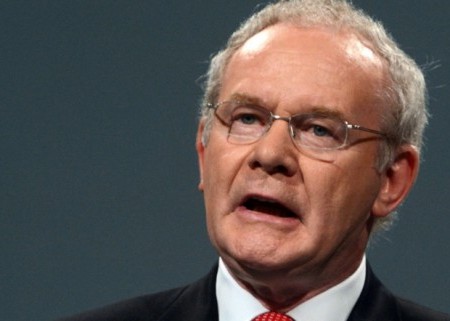 BY SINN FEIN FOYLE MLA MARTIN MCGUINNESS
BY SINN FEIN FOYLE MLA MARTIN MCGUINNESS
Ministers and senior government officials from across the island of Ireland will come together at the North South Ministerial Council (NSMC) in Armagh today to discuss what is potentially the most de-stabilising event facing our island since partition.
As an all-island institution emerging from the Good Friday Agreement, it’s fitting that the NSMC is the vehicle for these discussions because Brexit presents challenges to all the people of this island, north and south, and it also presents challenges to the spirit, the letter and the architecture and purpose of the Good Friday Agreement.
The NSMC has been central to breaking down barriers on our island and to building the kind of co-operation and new relationships which are needed for a society emerging from conflict.
It has been at the forefront of ground-breaking joint working, particularly in areas like cancer care and children’s heart services.
It has played a pivotal role in terms of investing in disadvantaged and border communities, distributing much-needed Peace and European funding to consolidate the progress we have all enjoyed over the last 20 years.
Brexit – and in particular the British government’s apparent determination to drag us out of the European Union against our will – flies in the face of all of that.
It undermines the progress of the past two decades and the very integrity of the Good Friday Agreement which created institutions like the NSMC in the first place and which is inextricably linked to European laws, rights and citizenship entitlements.
Issues like a hard border, customs posts and an erosion of the common travel area are the physical manifestations of such a disastrous and retrograde shift in the relationships on and between these islands.
The economic and social impact of all of this has been well-rehearsed and is already beginning to play itself out in terms of increasing prices, currency fluctuations, investor reluctance and a disgraceful upsurge in racism and xenophobia.
That is the seriousness of the situation we are all facing. It is not about being a ‘whingeing remoaner’ or seeking to re-run a referendum.
Why would we want a re-run when the north of Ireland voted to remain?
It’s about having that democratically-expressed vote recognised and respected in all discussion in the time ahead.
Our circumstances are unique and there needs to be a recognition of that. The implications for our politics, social interaction and economic prosperity are grave.
Others have said Brexit means Brexit without any sense of what that means and without ever spelling out the detail.
Well, for us and for the 56 per cent of the electorate who voted to remain, that will involve protecting all the benefits that EU membership currently affords the north of Ireland and to ensuring there is no retrograde steps in terms of the peace process, European funding, the border or the free movement of people, goods and services on this island.
The way to achieve that is to ensure that the unique circumstances that we face in the north of Ireland are recognised and provided for through an EU-designated special status for the north.
There are precedents for this within Europe so it can be done. There are different forms of EU integration.
There is a clear recognition in Brussels of the unique circumstances in Ireland and we are, of course, facing an unprecedented negotiation so everything is possible, everything should be on the table and, as we have witnessed over recent days, everything remains in play.
What will be required is the political will to achieve special status for the north, particularly on the part of the Dublin government who will a have unique and powerful role in the negotiations due to take place once Article 50 is triggered.
As a highly-respected EU member state and the closest trading partner to Britain, the Irish government effectively have a seat on both sides of the table in the negotiations. They must use that influence to safeguard the national interest of all our people, of our interdependent and interlinked economies north and south, and the safeguards and advances of the Good Friday and other agreements.
As a co-guarantor of the Good Friday Agreement, they have a legal responsibility to do so. They also have a moral duty to those people from all communities north of the border who democratically voted to remain in the EU and they have a political and diplomatic duty to the rapidly growing numbers of Irish citizens living in the north.
No-one knows what the coming period will bring but it is imperative that all of us who represent citizens on the island – from whatever community or political allegiance – use our collective influence to protect the very many benefits which EU membership has brought to our people, our island and our peace.
Tags:




